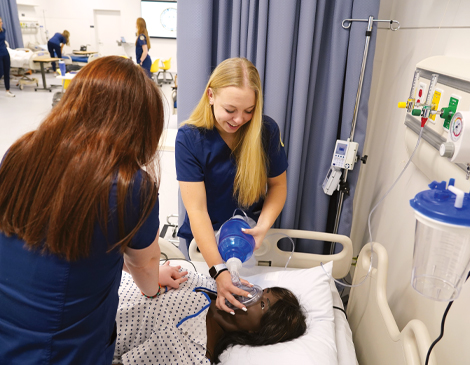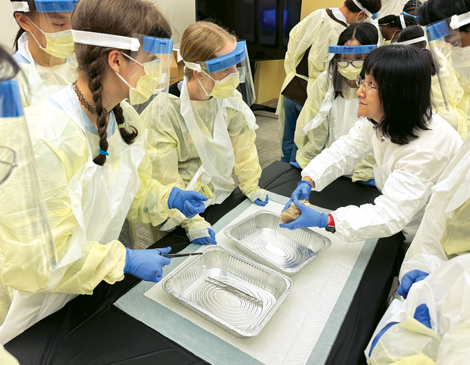Beachwood City Schools
At Beachwood City Schools, preparing students for the workforce takes a combination of both knowledge and hands-on experience. For some students, this means attending a partnering vocational program for pursuits such as culinary school, marketing or education. Other students, though, can hone and develop their real-world skills right in the classroom.
“From a curriculum perspective, we are focusing on providing students with opportunities through experiential learning to interact with and engage with people from different professions and interests,” says Linda LoGalbo, director of curriculum and instruction.
Take, for instance, the STEM Program at Beachwood City Schools, which helps kids learn skills such as problem-solving and collaboration. Middle school and high school students utilize a state-of-the-art engineering lab to design, create and build projects using advanced equipment such as 3D printers, laser and vinyl cutters, a CNC router and woodworking machinery. In 2022, the school district expanded this program to include elementary children, who build robotic kits similar to LEGOs.
“Our young kids love those classes with the design and engineering because they are very curious and natural learners,” LoGalbo says. “They are very excited about the opportunity to create and build and integrate the technology.”
While STEM challenges and tasks start young, students interested in health care careers can look forward to the Beachwood Medical Academy in high school. The program prepares teens for competitive pre-med programs through advanced coursework and hospital immersion experiences. Highlights include a three-day camp, hosted in partnership with University Hospitals Ahuja Medical Center, which combines lectures with hands-on activities such as dissecting a cow’s heart and practicing suturing techniques. Students also have the opportunity to participate in an anatomy lab hosted by the Case Western Reserve University Physician Assistant Program.
“This is an interactive experience where students get an opportunity to be in a hospital setting and to learn from physicians,” LoGalbo says. “We really tap into the global hub for medicine in Northeast Ohio to get physicians of all specialties to speak to our students.”
A recent addition to the Medical Academy is a day with the Cleveland Food Bank, where students learn about the effects of poverty on health care and spend the afternoon volunteering. This approach to career development reflects the school district’s mission statement of nurturing and guiding students to be intellectual entrepreneurs with a social conscience.
“Intellectual entrepreneurship is about learning and getting as much information as you can, and the social consciousness is about applying the information to be helpful,” LoGalbo shares. “We really encourage kids to think about what kinds of problems in this world need to be solved and then how can they apply their knowledge to come up with solutions for that.”
Tri-C

In the last few years, the health care industry has been one of the most rapidly changing fields. To navigate this, the nursing program at Tri-C has doubled down on emphasizing foundational principles that ensure students are prepared to go out and serve.
“No matter what changes happen in health care, our approach with students remains the same,” says Wendy Batch-Wilson, dean of nursing at Tri-C. “We give them the foundational principles that allow them to be nimble and adapt to changes.”
In addition to critical thinking, clinical judgment and patient advocacy, one of the most important skills that Tri-C instills in its students is a commitment to work. While career stability and earning potential are certainly positives of a profession in health care, sustaining a long and fulfilling career requires grit and perseverance.
“You have to be committed,” Batch-Wilson says. “The education and the work are challenging, because you are entrusted to care for people’s well-being and their lives.”
It helps that a lot of the faculty at Tri-C are practitioners in the field. They are well suited to share their knowledge and experience of what it means to be on the front lines of health care.
“Our faculty bring that expertise to the classroom, skills lab and clinical setting so students are ready when they enter the workforce,” says Batch-Wilson. “And then we are in continuous contact with our health care partners to understand their needs so we can incorporate that into our curriculum.”
This approach helps students continue on to earn their bachelor’s degrees after they complete their associate program at Tri-C, as well as climb from State Tested Nurse Aid to LPN to RN. Tri-C’s four campuses spread across Cuyahoga County also position students to transition into health care facilities and hospitals throughout the region, including in Beachwood.
“More than 85% of our graduates live and work in Cuyahoga County,” says Batch-Wilson. “We connect students with health care partners to serve all facets of the health care sector in Northeast Ohio.”
John Carroll University

Students enrolled in John Carroll University’s (JCU) engineering physics program aren’t just learning textbook science. They’re delving deep into a well-rounded curriculum that equips them with the adaptability to succeed in an ever-evolving field.
“Engineering physics is an interdisciplinary field of engineering that emphasizes foundational modern physics and its application to 21st century materials and technology,” explains John Carroll Professor of Physics Jeff Dyck. “The coursework, culminating in a significant yearlong engineering design, has been envisioned to allow students to be prepared to enter a wide array of engineering fields."
The program has been developed by faculty made up of both physicists and engineers working together to create the curriculum, which focuses on fundamentals that provide “broad adaptability.” In other words, graduates aren’t pigeon-holed into one facet of engineering.
Because of JCU’s liberal arts foundation, students are taking an array of classes that help them hone the communication and reasoning skills that employers seek. “Today’s engineering problems require much more than just science and math, but also ethics, communication and much more from the humanities,” Dyck says.
Ohio is a great place for graduates to launch their careers, too. Dyck points to the new Intel facility coming to the state, as well as the plethora of opportunities right here in Northeast Ohio. Think NASA, UH, Cleveland Clinic and local biotech firms, to name a few.
JCU also has an alumni panel, which has created a mentoring program that helps grow relationships with local companies. A connection with Beachwood’s MIM Software is just one example. “We’ve had people from MIM come visit our department, helping with our professional development program, which is a required course to know how to compete for an internship and how to be prepared,” Dyck says.
Also exciting for JCU is the plan to seek ABET accreditation after the school’s first cohort of students graduate this spring. ABET is the “official accrediting body for engineering programs,” explains Dyck. “ABET accreditation signals to prospective students and employers that we are meeting the high standards and expectations of the engineering profession with our program, and our graduates will be prepared to excel.”




